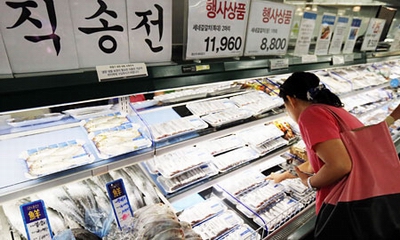
Worries over the safety of Japanese fisheries are deepening as the neighboring country’s plant operator Tokyo Electric Power said last week that about 300 tons of highly contaminated water had leaked from a storage tank at the Fukushima Daiichi plant.
Consumers have been reducing their purchases of fishery products ― not only from Japan, but also from local vendors and from other parts of the world.
According to Lotte Mart, one of three major discount chains, sale of fishery products dropped 18.3 percent from Aug. 1 to 25, compared to the same period a year ago.
The food authorities say that they are tightening safety checks of fisheries from Japan and the Pacific Ocean, and so far no case has been detected which exceeds permissible levels of nuclear radiation.
The Ministry of Food and Drug Safety said that it found tuna from Japan containing 1 Bq/kg of cesium earlier this month, but it was a mere 1 percent of the recommended permissible level. It said besides that, no nuclear radioactive substances were detected from Japanese fisheries.
However, activists say that the authorities are “lying” simply because notwithstanding how how little the amount of nuclear contamination is in a product, the potential threat to human health cannot be overlooked.
“Ingesting even a small amount of radioactive substances can cause cancer. According to the U.S. National Academy of Sciences (NAS), there is a correlation between the amount of exposure to radioactive materials and occurrences of cancer,” said Lee Bo-ah, an official of the Green Party Korea.
The NAS has provided reports about the effects of atomic radiation on living organisms. It established a special committee to study the issue in 1955, in response to the increasing but uncoordinated accumulation of data on the effects of atomic radiation.
Lee urged the government to stop importing Japanese fishery products, and in particular, to ban schools from providing school meals that use fishery products from Japan, as children are more vulnerable to the effects of cesium, radioactive iodine and plutonium.
However, the government has done little to stop the importation and consumption of Japanese fishery products for food used in school meals. According to data released by Rep. Yoo Eun-hye of the main opposition Democratic Party, 2,231 kilograms of Japanese fishery products had been consumed at 705 local primary and secondary schools from March 2011 to Aug. 2012.
Retailers have been more aggressive in prohibiting Japanese fishery goods, even before the nuclear disaster. For instance, E-mart, the nation’s biggest discount chain, stopped selling Japanese fishery products beginning in March 2011 due to safety concerns when the Tohoku Earthquake and tsunami occurred.







